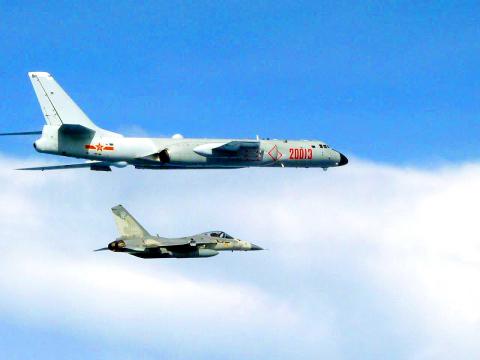Taiwanese will gradually get used to Chinese air force drills that encircle the nation, China said yesterday, while Premier William Lai (賴清德) reiterated the nation’s desire for peaceful relations with Beijing.
China has taken an increasingly hostile stance toward Taiwan since President Tsai Ing-wen (蔡英文), of the Democratic Progressive Party (DPP), last year won the presidential election, and has stepped up its rhetoric and military exercises.
Beijing suspects Tsai of pushing for Taiwanese independence, a red line for China.

Photo courtesy of the Ministry of National Defense
Tsai said she wants peace with China, but also that she would defend Taiwan’s security and way of life.
Chinese state media has given broad coverage to “encirclement” exercises near Taiwan this month, including showing photographs of Chinese bombers with what they said was Taiwan’s highest peak, Yushan (玉山), visible in the background.
Asked about the continuing drill’s and the footage released by the air force, China’s Taiwan Affairs Office said it and the Chinese Ministry of National Defense had repeatedly described the exercises as routine.
“Everyone will slowly get used it,” office spokesman An Fengshan (安峰山) told a routine news briefing, without elaborating.
The Chinese People’s Liberation Army (PLA) has carried out 16 rounds of exercises close to Taiwan in the past year or so, the Taiwanese Ministry of National Defense said in a white paper this week.
China’s military threat was growing by the day, it added.
The government has accused Beijing of not understanding democracy when it criticizes Taipei.
The US, Japan and South Korea are paying close attention to the PLA’s activities, Lai said at an end of year news conference in Taipei.
“Under the president’s leadership, the Executive Yuan pushes forward government affairs, stabilizing cross-strait relations toward peaceful development,” Lai said.

NATIONAL SECURITY THREAT: An official said that Guan Guan’s comments had gone beyond the threshold of free speech, as she advocated for the destruction of the ROC China-born media influencer Guan Guan’s (關關) residency permit has been revoked for repeatedly posting pro-China content that threatens national security, the National Immigration Agency said yesterday. Guan Guan has said many controversial things in her videos posted to Douyin (抖音), including “the red flag will soon be painted all over Taiwan” and “Taiwan is an inseparable part of China,” while expressing hope for expedited “reunification.” The agency received multiple reports alleging that Guan Guan had advocated for armed reunification last year. After investigating, the agency last month issued a notice requiring her to appear and account for her actions. Guan Guan appeared as required,

A strong cold air mass is expected to arrive tonight, bringing a change in weather and a drop in temperature, the Central Weather Administration (CWA) said. The coldest time would be early on Thursday morning, with temperatures in some areas dipping as low as 8°C, it said. Daytime highs yesterday were 22°C to 24°C in northern and eastern Taiwan, and about 25°C to 28°C in the central and southern regions, it said. However, nighttime lows would dip to about 15°C to 16°C in central and northern Taiwan as well as the northeast, and 17°C to 19°C elsewhere, it said. Tropical Storm Nokaen, currently

‘NATO-PLUS’: ‘Our strategic partners in the Indo-Pacific are facing increasing aggression by the Chinese Communist Party,’ US Representative Rob Wittman said The US House of Representatives on Monday released its version of the Consolidated Appropriations Act, which includes US$1.15 billion to support security cooperation with Taiwan. The omnibus act, covering US$1.2 trillion of spending, allocates US$1 billion for the Taiwan Security Cooperation Initiative, as well as US$150 million for the replacement of defense articles and reimbursement of defense services provided to Taiwan. The fund allocations were based on the US National Defense Authorization Act for fiscal 2026 that was passed by the US Congress last month and authorized up to US$1 billion to the US Defense Security Cooperation Agency in support of the

PAPERS, PLEASE: The gang exploited the high value of the passports, selling them at inflated prices to Chinese buyers, who would treat them as ‘invisibility cloaks’ The Yilan District Court has handed four members of a syndicate prison terms ranging from one year and two months to two years and two months for their involvement in a scheme to purchase Taiwanese passports and resell them abroad at a massive markup. A Chinese human smuggling syndicate purchased Taiwanese passports through local criminal networks, exploiting the passports’ visa-free travel privileges to turn a profit of more than 20 times the original price, the court said. Such criminal organizations enable people to impersonate Taiwanese when entering and exiting Taiwan and other countries, undermining social order and the credibility of the nation’s